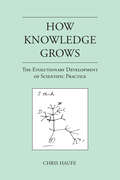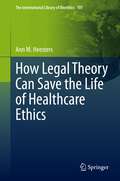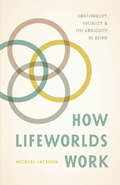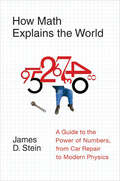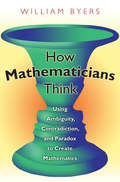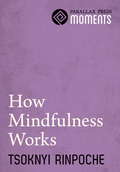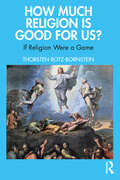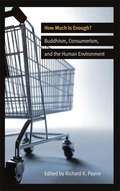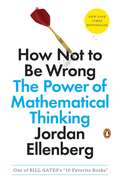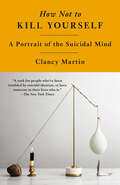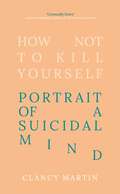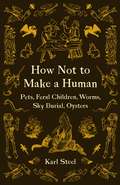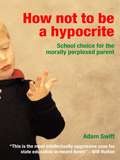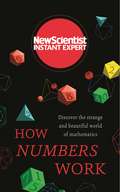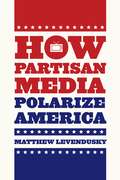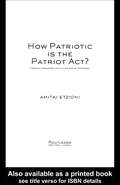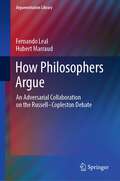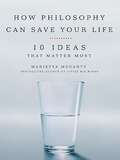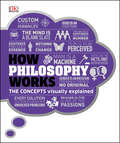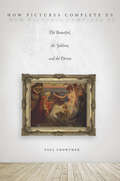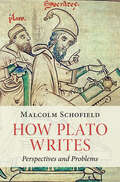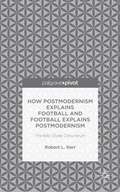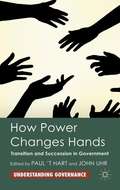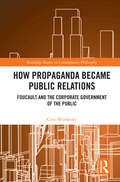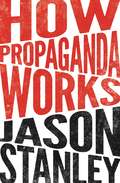- Table View
- List View
How Knowledge Grows: The Evolutionary Development of Scientific Practice
by Chris HaufeAn argument that the development of scientific practice and growth of scientific knowledge are governed by Darwin&’s evolutionary model of descent with modification.Although scientific investigation is influenced by our cognitive and moral failings as well as all of the factors impinging on human life, the historical development of scientific knowledge has trended toward an increasingly accurate picture of an increasing number of phenomena. Taking a fresh look at Thomas Kuhn&’s 1962 work, The Structure of Scientific Revolutions, in How Knowledge Grows Chris Haufe uses evolutionary theory to explain both why scientific practice develops the way it does and how scientific knowledge expands. This evolutionary model, claims Haufe, helps to explain what is epistemically special about scientific knowledge: its tendency to grow in both depth and breadth.Kuhn showed how intellectual communities achieve consensus in part by discriminating against ideas that differ from their own and isolating themselves intellectually from other fields of inquiry and broader social concerns. These same characteristics, says Haufe, determine a biological population&’s degree of susceptibility to modification by natural selection. He argues that scientific knowledge grows, even across generations of variable groups of scientists, precisely because its development is governed by Darwinian evolution. Indeed, he supports the claim that this susceptibility to modification through natural selection helps to explain the epistemic power of certain branches of modern science. In updating and expanding the evolutionary approach to scientific knowledge, Haufe provides a model for thinking about science that acknowledges the historical contingency of scientific thought while showing why we nevertheless should trust the results of scientific research when it is the product of certain kinds of scientific communities.
How Legal Theory Can Save the Life of Healthcare Ethics (The International Library of Bioethics #101)
by Ann M. HeestersThis book argues that legal theory provides a jumping-off point for the study of controversial topics related to the work of Practicing Healthcare Ethicists (PHEs). Healthcare ethics consultation has had a place in healthcare for many decades yet the nature of the work is not well understood by many of its critics as well as its defenders. PHEs have been described as compromised and ineffectual, politicised and undemocratic, and their promise to offer sound advice has been deemed irredeemably incoherent in the context of value pluralism. Legal theorists have long attended to the relationship between law and morality, and the supposed tension between democracy and the role of an expert judiciary. An appreciation that these debates are not unique to the practice of healthcare ethics can help PHEs to engage critics with a renewed confidence and some fresh approaches to perennial, and hitherto unproductive, arguments. This book will be of great interest to practicing healthcare ethicists, as well as those who rely upon their services (healthcare professionals and healthcare leaders, patients, and their families) as well as academics working in the broader field of bioethics.
How Lifeworlds Work: Emotionality, Sociality, and the Ambiguity of Being
by Michael JacksonMichael Jackson has spent much of his career elaborating his rich conception of lifeworlds, mining his ethnographic and personal experience for insights into how our subjective and social lives are mutually constituted. In How Lifeworlds Work, Jackson draws on years of ethnographic fieldwork in West Africa to highlight the dynamic quality of human relationships and reinvigorate the study of kinship and ritual. How, he asks, do we manage the perpetual process of accommodation between social norms and personal emotions, impulses, and desires? How are these two dimensions of lived reality joined, and how are the dual imperatives of individual expression and collective viability managed? Drawing on the pragmatist tradition, psychology, and phenomenology, Jackson offers an unforgettable, beautifully written account of how we make, unmake, and remake, our lifeworlds.
How Math Explains the World: A Guide to the Power of Numbers, from Car Repair to Modern Physics
by James D. Stein&“Explores the application of math to problem solving in the everyday. . . . [W]ill appeal to both casual and serious fans of math or physics.&” —Publishers Weekly In How Math Explains the World, mathematician Stein reveals how seemingly arcane mathematical investigations and discoveries have led to bigger, more world-shaking insights into the nature of our world. In the four main sections of the book, Stein tells the stories of the mathematical thinkers who discerned some of the most fundamental aspects of our universe. From their successes and failures, delusions, and even duels, the trajectories of their innovations—and their impact on society—are traced in this fascinating narrative. Quantum mechanics, space-time, chaos theory and the workings of complex systems, and the impossibility of a &“perfect&” democracy are all here. Stein's book is both mind-bending and practical, as he explains the best way for a salesman to plan a trip, examines why any thought you could have is imbedded in the number p, and—perhaps most importantly—answers one of the modern world's toughest questions: why the garage can never get your car repaired on time. Friendly, entertaining, and fun, How Math Explains the World is the first book by one of California's most popular math teachers, a veteran of both &“math for poets&” and Princeton's Institute for Advanced Studies. And it's perfect for any reader wanting to know how math makes both science and the world tick.
How Mathematicians Think: Using Ambiguity, Contradiction, and Paradox to Create Mathematics
by William ByersTo many outsiders, mathematicians appear to think like computers, grimly grinding away with a strict formal logic and moving methodically--even algorithmically--from one black-and-white deduction to another. Yet mathematicians often describe their most important breakthroughs as creative, intuitive responses to ambiguity, contradiction, and paradox. A unique examination of this less-familiar aspect of mathematics, How Mathematicians Think reveals that mathematics is a profoundly creative activity and not just a body of formalized rules and results. Nonlogical qualities, William Byers shows, play an essential role in mathematics. Ambiguities, contradictions, and paradoxes can arise when ideas developed in different contexts come into contact. Uncertainties and conflicts do not impede but rather spur the development of mathematics. Creativity often means bringing apparently incompatible perspectives together as complementary aspects of a new, more subtle theory. The secret of mathematics is not to be found only in its logical structure. The creative dimensions of mathematical work have great implications for our notions of mathematical and scientific truth, and How Mathematicians Think provides a novel approach to many fundamental questions. Is mathematics objectively true? Is it discovered or invented? And is there such a thing as a "final" scientific theory? Ultimately, How Mathematicians Think shows that the nature of mathematical thinking can teach us a great deal about the human condition itself.
How Mindfulness Works
by Tsoknyi RinpocheHow Mindfulness Works> is part of the Parallax Press Moments series of short ebooks. A stand alone chapter from Solid Ground: Buddhist Wisdom for Difficult Times.
How Much Religion is Good for Us?: If Religion Were a Game
by Thorsten Botz-BornsteinHow Much Religion is Good for Us? is a provocative book which examines parallels between play and religion from a philosophical, theological, and anthropological perspective.Understanding “religion as a game” in the context of secular culture, it explores the “playful” patterning of spiritual and religious belief in modern societies. Drawing on the Nietzschean concept of a dead but powerful God, the book depicts modern civilizations as players treading a secular age in which the spirit of religion unconsciously survives. It argues that the spirit of religion is preserved in cultures in the form of a spiritual game, distilling moral precepts and imperatives much like poetry and works of art do. Comparative in scope, it references Christianity, Buddhism, Islam, Sufism, and Daoism.This interdisciplinary volume is an outstanding resource for students and scholars of Religious Studies, Islamic Studies, Cultural Studies, Philosophy, and Anthropology.
How Much is Enough?
by Richard K. PayneThe massive outpouring of consumer products available today might alone lead one to ask "How much is enough?" But at the same time, if we allow ourselves to see the social, political, economic and environmental consequences of the system that produces such a mass of "goods," then the question is not simply a matter of one's own personal choice, but points to the profound interconnectedness of our day to day decisions about "How much is enough?" The ease with which we can acquire massive quantities of food, clothing, kitchenware, and various electronic goods directly connects each of us with not only environmental degradation caused by strip mining in West Virginia, and with sweat shops and child labor in India or Africa, but also with the ongoing financial volatility of Western capitalist economies, and the increasing discrepancies of wealth in all countries. This interconnectedness is the human environment, a phrase intended to point toward the deep interconnection between the immediacy of our own lives, including the question of "How much is enough?," and both the social and natural worlds around us. This collection brings together essays from an international conference jointly sponsored by Ryukoku University, Kyoto, and the Institute of Buddhist Studies, Berkeley. The effects of our own decisions and actions on the human environment is examined from several different perspectives, all informed by Buddhist thought. The contributors are all simultaneously Buddhist scholars, practitioners, and activists - thus the collection is not simply a conversation between these differing perspectives, but rather demonstrates the integral unity of theory and practice for Buddhism.
How Not to Be Wrong: The Power of Mathematical Thinking
by Jordan Ellenberg<P>The Freakonomics of math—a math-world superstar unveils the hidden beauty and logic of the world and puts its power in our handsThe math we learn in school can seem like a dull set of rules, laid down by the ancients and not to be questioned. In How Not to Be Wrong, Jordan Ellenberg shows us how terribly limiting this view is: Math isn’t confined to abstract incidents that never occur in real life, but rather touches everything we do—the whole world is shot through with it. <P>Math allows us to see the hidden structures underneath the messy and chaotic surface of our world. It’s a science of not being wrong, hammered out by centuries of hard work and argument. Armed with the tools of mathematics, we can see through to the true meaning of information we take for granted: How early should you get to the airport? What does “public opinion” really represent? Why do tall parents have shorter children? Who really won Florida in 2000? And how likely are you, really, to develop cancer? <P>How Not to Be Wrong presents the surprising revelations behind all of these questions and many more, using the mathematician’s method of analyzing life and exposing the hard-won insights of the academic community to the layman—minus the jargon. Ellenberg chases mathematical threads through a vast range of time and space, from the everyday to the cosmic, encountering, among other things, baseball, Reaganomics, daring lottery schemes, Voltaire, the replicability crisis in psychology, Italian Renaissance painting, artificial languages, the development of non-Euclidean geometry, the coming obesity apocalypse, Antonin Scalia’s views on crime and punishment, the psychology of slime molds, what Facebook can and can’t figure out about you, and the existence of God. <P>Ellenberg pulls from history as well as from the latest theoretical developments to provide those not trained in math with the knowledge they need. Math, as Ellenberg says, is “an atomic-powered prosthesis that you attach to your common sense, vastly multiplying its reach and strength.” With the tools of mathematics in hand, you can understand the world in a deeper, more meaningful way. How Not to Be Wrong will show you how. <P><b>A New York Times Bestseller</b>
How Not to Kill Yourself: A Portrait of the Suicidal Mind
by Clancy MartinFINALIST FOR THE KIRKUS PRIZE FOR NONFICTION • ONE OF TIME'S 100 MUST-READ BOOKS OF THE YEAR • ONE OF THE NEW YORK TIMES BOOK REVIEW'S CRITICS' PICKS • ONE OF THE BOSTON GLOBE&’S 55 BOOKS WE LOVED THIS YEAR • ONE OF KIRKUS&’S BEST NONFICTION BOOKS OF THE YEAR• An intimate, insightful, at times even humorous blend of memoir and philosophy that examines why the thought of death is so compulsive for some while demonstrating that there&’s always another solution—from the acclaimed writer and philosophy professor, based on his viral essay, &“I&’m Still Here.&” &“A deep meditation that searches through Martin&’s past looking for answers about why he is the way he is, while also examining the role suicide has played in our culture for centuries, how it has evolved, and how philosophers have examined it.&” —Esquire &“A rock for people who&’ve been troubled by suicidal ideation, or have someone in their lives who is.&” —The New York Times&“If you&’re going to write a book about suicide, you have to be willing to say the true things, the scary things, the humiliating things. Because everybody who is being honest with themselves knows at least a little bit about the subject. If you lie or if you fudge, the reader will know.&”The last time Clancy Martin tried to kill himself was in his basement with a dog leash. It was one of over ten attempts throughout the course of his life. But he didn&’t die, and like many who consider taking their own lives, he hid the attempt from his wife, family, coworkers, and students, slipping back into his daily life with a hoarse voice, a raw neck, and series of vague explanations.In How Not to Kill Yourself, Martin chronicles his multiple suicide attempts in an intimate depiction of the mindset of someone obsessed with self-destruction. He argues that, for the vast majority of suicides, an attempt does not just come out of the blue, nor is it merely a violent reaction to a particular crisis or failure, but is the culmination of a host of long-standing issues. He also looks at the thinking of a number of great writers who have attempted suicide and detailed their experiences (such as David Foster Wallace, Yiyun Li, Akutagawa, Nelly Arcan, and others), at what the history of philosophy has to say both for and against suicide, and at the experiences of those who have reached out to him across the years to share their own struggles.The result combines memoir with critical inquiry to powerfully give voice to what for many has long been incomprehensible, while showing those presently grappling with suicidal thoughts that they are not alone, and that the desire to kill oneself—like other self-destructive desires—is almost always temporary and avoidable.
How Not to Kill Yourself: Portrait of a Suicidal Mind
by Clancy MartinThe last time Clancy Martin tried to kill himself was in his basement with a dog leash. He didn&’t write a note. How Not to Kill Yourself is an affirmation of life by someone who has tried to end it multiple times. It&’s about standing in your bathroom every morning, gearing yourself up to die. It&’s about choosing to go on living anyway. In an unflinching account of his darkest moments, Clancy Martin makes the case against suicide, drawing on the work of philosophers from Seneca to Jean Améry. Through critical inquiry and practical steps, we might yet answer our existential despair more freely – and with a little more creativity.
How Not to Make a Human: Pets, Feral Children, Worms, Sky Burial, Oysters
by Karl SteelFrom pet keeping to sky burials, a posthuman and ecocritical interrogation of and challenge to human particularity in medieval texts Mainstream medieval thought, like much of mainstream modern thought, habitually argued that because humans alone had language, reason, and immortal souls, all other life was simply theirs for the taking. But outside this scholarly consensus teemed a host of other ways to imagine the shared worlds of humans and nonhumans. How Not to Make a Human engages with these nonsystematic practices and thought to challenge both human particularity and the notion that agency, free will, and rationality are the defining characteristics of being human.Recuperating the Middle Ages as a lost opportunity for decentering humanity, Karl Steel provides a posthuman and ecocritical interrogation of a wide range of medieval texts. Exploring such diverse topics as medieval pet keeping, stories of feral and isolated children, the ecological implications of funeral practices, and the &“bare life&” of oysters from a variety of disanthropic perspectives, Steel furnishes contemporary posthumanists with overlooked cultural models to challenge human and other supremacies at their roots. By collecting beliefs and practices outside the mainstream of medieval thought, How Not to Make a Human connects contemporary concerns with ecology, animal life, and rethinkings of what it means to be human to uncanny materials that emphasize matters of death, violence, edibility, and vulnerability.
How Not to be a Hypocrite: School Choice for the Morally Perplexed Parent
by Adam SwiftHow not to be a hypocrite: the indispensable guide to school choice that morally perplexed parents have been waiting for.Many of us believe in social justice and equality of opportunity - but we also want the best for our kids. How can we square our political principles with our special concern for our own children? This marvellous book takes us through the moral minefield that is school choice today.Does a commitment to social justice mean you have to send your children to the local comprehensive - regardless of its academic results? Is it hypocritical to disapprove of private schools and yet send your child to one? Some parents feel guilty but shouldn't. Others should feel guilty but don't. Read How Not to be a Hypocrite, then answer the questionnaire, and work out where you stand on this crucial issue.
How Numbers Work: Discover the strange and beautiful world of mathematics (Instant Expert)
by New ScientistThink of a number between one and tenNo, hang on, let's make this interesting. Between zero and infinity. Even if you stick to the whole numbers, there are a lot to choose from - an infinite number in fact. Throw in decimal fractions and infinity suddenly gets an awful lot bigger (is that even possible?) And then there are the negative numbers, the imaginary numbers, the irrational numbers like p which never end. It literally never ends.The world of numbers is indeed strange and beautiful. Among its inhabitants are some really notable characters - pi, e, the square root of minus two and the famous golden ratio to name just a few. Prime numbers occupy a special status. Zero is very odd indeed. And even some apparently common-or-garden integers such as 37 have special properties. Adventures In Mathematics takes a tour of this mind-blowing but beautiful world of numbers and the mathematical rules that connect them. Find out mathematicians' favourite numbers, and the ones they are afraid of (spoiler: it isn't 13). Discover the incredible connection between numbers and the rules of nature. And learn some amazing mathematical tricks that will keep you amused for hours.
How Partisan Media Polarize America
by Matthew LevenduskyForty years ago, viewers who wanted to watch the news could only choose from among the major broadcast networks, all of which presented the same news without any particular point of view. Today we have a much broader array of choices, including cable channels offering a partisan take. With partisan programs gaining in popularity, some argue that they are polarizing American politics, while others counter that only a tiny portion of the population watches such programs and that their viewers tend to already hold similar beliefs. <P><P> In How Partisan Media Polarize America, Matthew Levendusky confirms--but also qualifies--both of these claims. Drawing on experiments and survey data, he shows that Americans who watch partisan programming do become more certain of their beliefs and less willing to weigh the merits of opposing views or to compromise. And while only a small segment of the American population watches partisan media programs, those who do tend to be more politically engaged, and their effects on national politics are therefore far-reaching. <P>< In a time when politics seem doomed to partisan discord, How Partisan Media Polarize America offers a much-needed clarification of the role partisan media might play.
How Patriotic is the Patriot Act?: Freedom Versus Security in the Age of Terrorism
by Amitai EtzioniIn this short book, Etzioni, the well-known and respected public intellectual and communitarian thinker, charts a middle course, or third way 'between those who are committed to shore up our liberties but blind to the needs of public security, as well as those who never met a right they are not willing to curtail to give authorities an even freer hand.' This book will prove a useful guide for citizens looking for a thought provoking, well-reasoned and sober analysis of one of the hot button issues of our time.
How Philosophers Argue: An Adversarial Collaboration on the Russell--Copleston Debate (Argumentation Library #41)
by Fernando Leal Hubert MarraudThis volume presents a double argumentative analysis of the debate between Bertrand Russell and Frederick Copleston on the existence of God. It includes an introduction justifying the choice of text and describing the historical and philosophical background of the debate. It also provides a transcript of the debate, based in part on the original recording.The argumentative analyses occupy Parts I and II of the book. In Part I the argumentative process is analysed by means of the ideal model of critical discussion, the workhorse of pragma-dialectics. Part I shows how the two parties go through the four stages of a critical discussion. It highlights the questions raised over and beyond the presiding question of whether God exists and examines almost a hundred questions that are raised. Many are left in the air, whereas a few others give rise to sundry sub-discussions or meta-dialogues. In Part II the theoretical framework of argument dialectic is put to work: argument structures are identified by means of punctuation marks, argumentative connectors and operators, allowing to see the argumentative exchange as the collaborative construction of a macro-argument. Such a macro-argument is both a joint product of the arguers and a complex structure representing the dialectical relationships between the individual arguments combined in it. Finally, the complementarity of the two approaches is addressed. Thus the book can be described as an exercise in adversarial collaboration.
How Philosophy Can Save Your Life
by Marietta MccartyDiscover how great philosophers can help you live a more purposeful and peaceful life. This inspiring new book from the bestselling author of Little Big Minds reveals how the heartbeats of philosophy- clear thinking, quiet reflection, and good conversation- are essential ingredients in a well-lived life. Full of great discussion ideas and activities you can do with a group, How Philosophy Can Save Your Life is framed around ten "big ideas"-themes that, according to McCarty, are necessary to grasp if one wants to live a truly fulfilling life. They are: 1. Simplicity (philosophers include Epicurus and Charlotte Joko Beck) 2. Communication (philosophers include bell hooks and Karl Jaspers) 3. Perspective (philosophers include Bertrand Russell and Mary Wollstonecraft) 4. Flexibility (philosophers include Socrates, Plato and Alan Watts) 5. Empathy (philosophers include the Dalai Lama and Martin Luther King, Jr. ) 6. Individuality (philosophers include Jean-Paul Sartre and Elizabeth Spelman) 7. Belonging (philosophers include Albert Camus and Rita Manning) 8. Serenity (philosophers include Epictetus and Lao Tzu) 9. Possibility (philosophers include John Stuart Mill and Simone de Beauvoir) 10. Joy (philosophers include Shunryu Suzuki and Jane Addams) So join the greatest thinkers of all time to discover the ideas that will help you live a happier, healthier life! .
How Philosophy Works: The Concepts Visually Explained (DK How Stuff Works)
by DKWhat is the meaning of life? Are we truly free? How can we make ethical choices? Discover the answers to life's greatest questions.Demystifying the key ideas of the world's greatest philosophers, and exploring all of the most important branches of philosophical thought in a uniquely visual way, this book is the perfect introduction to the history of philosophy. How Philosophy Works combines bold infographics and jargon-free text to demystify fundamental concepts about the nature of reality. Covering everything from ethics to epistemology and phenomenology, the book presents the ideas and theories of key philosophical traditions and philosophers - from Plato and Socrates to Nietzsche and Wittgenstein via Kant - in a novel, easy-to-understand way. Its infographics will help you to understand the elements of philosophy on a conceptual level and, by tackling life's "big questions", it will help you to look at the world in an entirely new way. With its unique graphic approach and clear, authoritative text, How Philosophy Works is the perfect introduction to philosophy, and the ideal companion to DK's The Philosophy Book in the "Big Ideas" series.
How Pictures Complete Us: The Beautiful, the Sublime, and the Divine
by Paul CrowtherDespite the wonders of the digital world, people still go in record numbers to view drawings and paintings in galleries. Why? What is the magic that pictures work on us? This book provides a provocative explanation, arguing that some pictures have special kinds of beauty and sublimity that offer aesthetic transcendence. They take us imaginatively beyond our finite limits and even invoke a sense of the divine. Such aesthetic transcendence forges a relationship with the ultimate and completes us psychologically. Philosophers and theologians sometimes account for this as an effect of art, but How Pictures Complete Us distinguishes itself by revealing how this experience is embodied in pictorial structures and styles. Through detailed discussions of artworks from the Renaissance through postmodern times, Paul Crowther reappraises the entire scope of beauty and the sublime in the context of both representational and abstract art, offering unexpected insights into familiar phenomena such as Ideal beauty, pictorial perspective, and what pictures are in the first place.
How Plato Writes: Perspectives and Problems
by Malcolm SchofieldPlato is a philosophical writer of unusual and ingenious versatility. His works engage in argument but are also full of allegory, imagery, myth, paradox and intertextuality. He astutely characterises the participants whom he portrays in conversation. Sometimes he composes fictive dialogues in dramatic form while at other times he does so as narratives. In this book, world-renowned scholar Malcolm Schofield illustrates the variety of the literary resources that Plato deploys to achieve his philosophical purposes. He draws key passages for discussion particularly, but not only, from Republic and the less well-known Laws and also shows how reconstructing the original historical context of a dialogue and of its assumed readership is essential to understanding Plato's approach. The book will open the eyes of readers of all levels of expertise to Plato's masterly ability as a writer and how an understanding of this is crucial if we are to appreciate his philosophy.
How Postmodernism Explains Football and Football Explains Postmodernism: The Billy Clyde Conundrum
by Robert KerrAmerican football and postmodernist theory are both objects of popular and scholarly interest that reveal remarkable sociological insights. Analysis of media-driven commercial football documents how narratives of sportsmanship/brutality, heroism/antiheroism, athleticism/self-indulgence, honor/chicanery, and chivalry/sexism compete and thrive.
How Power Changes Hands
by Paul ’t Hart John UhrHow can we strengthen the capacity of governments and parties to manage arrivals and departures at the top? Democracy requires reliable processes for the transfer of power from one generation of leaders to the next. This book introduces new analytical frameworks and presents the latest empirical evidence from comparative political research.
How Propaganda Became Public Relations: Foucault and the Corporate Government of the Public (Routledge Studies in Contemporary Philosophy)
by Cory WimberlyHow Propaganda Became Public Relations pulls back the curtain on propaganda: how it was born, how it works, and how it has masked the bulk of its operations by rebranding itself as public relations. Cory Wimberly uses archival materials and wide variety of sources — Foucault’s work on governmentality, political economy, liberalism, mass psychology, and history — to mount a genealogical challenge to two commonplaces about propaganda. First, modern propaganda did not originate in the state and was never primarily located in the state; instead, it began and flourished as a for-profit service for businesses. Further, propaganda is not focused on public beliefs and does not operate mainly through lies and deceit; propaganda is an apparatus of government that aims to create the publics that will freely undertake the conduct its clients’ desire. Businesses have used propaganda since the early twentieth century to construct the laboring, consuming, and voting publics that they needed to secure and grow their operations. Over that time, corporations have become the most numerous and well-funded apparatuses of government in the West, operating privately and without democratic accountability. Wimberly explains why liberal strategies of resistance have failed and a new focus on creating mass subjectivity through democratic means is essential to countering propaganda. This book offers a sophisticated analysis that will be of interest to scholars and advanced students working in social and political philosophy, Continental philosophy, political communication, the history of capitalism, and the history of public relations.
How Propaganda Works
by Jason StanleyOur democracy today is fraught with political campaigns, lobbyists, liberal media, and Fox News commentators, all using language to influence the way we think and reason about public issues. Even so, many of us believe that propaganda and manipulation aren't problems for us--not in the way they were for the totalitarian societies of the mid-twentieth century. In How Propaganda Works, Jason Stanley demonstrates that more attention needs to be paid. He examines how propaganda operates subtly, how it undermines democracy--particularly the ideals of democratic deliberation and equality--and how it has damaged democracies of the past.Focusing on the shortcomings of liberal democratic states, Stanley provides a historically grounded introduction to democratic political theory as a window into the misuse of democratic vocabulary for propaganda's selfish purposes. He lays out historical examples, such as the restructuring of the US public school system at the turn of the twentieth century, to explore how the language of democracy is sometimes used to mask an undemocratic reality. Drawing from a range of sources, including feminist theory, critical race theory, epistemology, formal semantics, educational theory, and social and cognitive psychology, he explains how the manipulative and hypocritical declaration of flawed beliefs and ideologies arises from and perpetuates inequalities in society, such as the racial injustices that commonly occur in the United States. How Propaganda Works shows that an understanding of propaganda and its mechanisms is essential for the preservation and protection of liberal democracies everywhere.
